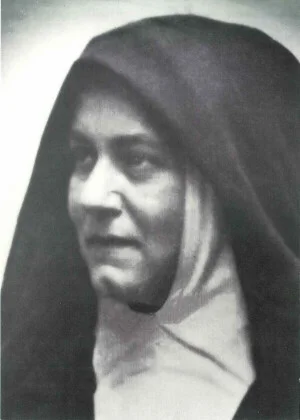‘[Love] is entirely turned towards God, but the created spirit embraces also itself in knowledge, bliss and self-acceptance. The surrender to God is at the same time surrender to one’s own self as loved by God and to the whole of creation.’ (Edith Stein)
Edith Stein around 1920
The International Association for the Study of the Philosophy of Edith Stein (IASPES) recently met in Vienna and Heiligenkreuz for an international conference with the theme of Edith Steins Challenge to Contemporary Anthropology. It opened with references to Edith Stein’s anthropology that go against the grain of what is commonly accepted in contemporary discourse on the human person: according to Stein, who gave much thought to the question of gender, men have a natural vocation to exercise dominion over the world, while women’s vocation lies in companionship and motherhood, both of which can be purely spiritual but will often find expression in marriage and childbirth. As Stein’s ‘anthropology of difference’ was further described, women are entrusted with all that is good and beautiful in the human being and, by implication, with fighting evil. Nature has predisposed them towards dealing with humans and concerning themselves more with the bigger whole, while men are more oriented towards things, and lose their humanity more easily (Zyzak).
In light of these views, which may resonate with everyday experience but which are nonetheless scientifically tenuous and politically taboo, it may seem hard to see where Stein could even begin to enter into a conversation with contemporary anthropology. However, as subsequent papers made manifest, Stein’s anthropology is more subtle and complex than this first, provocative glimpse might suggest.
As the above remarks may already suggest, Stein holds on to a notion of human nature or ‘essence’. However, she does not understand this in terms of identical characteristics displayed by all individuals of a species. As one conference paper argued, her combination of traditional and phenomenological accounts of essence much rather leads her to understand human essence in terms of ‘a myriad of overlapping potencies’, only ‘some of which are temporally unfolded in actual being’ (Gricoski). One implication of this is that, according to Stein, a woman’s vocation cannot for instance be reduced to that of (biological or spiritual) motherhood. Indeed, for each woman this natural vocation may not only unfold very differently but may also play a relatively more or less central role, alongside other more pronounced aspects of her essence.
This view is related also to another aspect of Stein’s thought, her interest in the person’s development as an individual. Here, too, Stein challenges modern thought without dismissing it tout court. She rejects the idea that we bestow value on the world and can thus autonomously create ourselves. According to Stein, value is much rather intrinsic to existence, including our own. Our individuality, which she characterises as something deeply mysterious, fully emerges where we enter into relation with what is given, where we receive this, let it resonate within us, respond to it and, in the process, allow it to shape us. Through such an encounter, wherein reality reveals its intrinsic value, we come to recognise our own value, and discover our self as loved by the source of all value, God. Stein’s path to individuality, then, is one of surrender, discovery and, above all, relationship with world, God and self. Our individual essence is revealed and handed to us, through an encounter with what lies outside of us.
Edith Stein, late 1941/early 1942
This leads us back to the question of gender. Stein acknowledges that it is difficult to separate between those aspects of our gendered existence which are an innate part of our essence and those which are culturally imposed. This is all the more the case as the potencies which belong to our essence are ‘temporally unfolded’ precisely—and only—through our relationship with the external world (Gricoski). By virtue of such modest acknowledgements, and by embedding our humanity in a productive tension of relationship and individuality, of surrender and transcendence, of what is given and what is in the process of becoming, Stein’s anthropology may take us some way towards challenging the ‘either-or’s that Christian and postmodern discussions of the human person sometimes seem to present us with. For, Stein does not simply turn away from traditional Christian concepts such as human essence, surrender to the other, or a vocation specific to our gender. Yet by approaching these concepts both from a traditionally Thomistic and a phenomenological perspective, she nuances them in a way that might convince even the modern skeptic.

